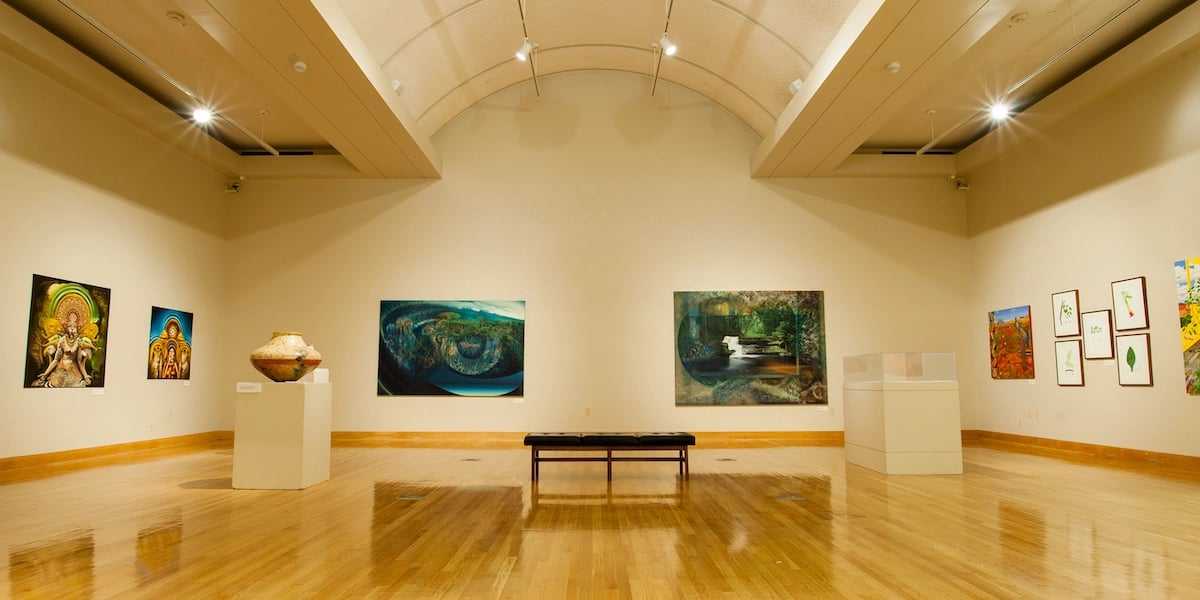
Last week, faculty members at Valparaiso University in Indiana voted against the school’s controversial plan to deaccession three works of art from the collection of its on-campus art museum, according to a report from the Chicago Tribune.
The proposal to sell artworks was introduced last year by university president Jose Padilla in an effort to quickly raise funds for a dorm renovation project that is itself part of a broader strategy to boost enrollment figures at the struggling school.
Padilla put forth three prized paintings from the college’s Brauer Museum of Art for potential deaccession: Frederic E. Church’s Mountain Landscape (circa 1849), Childe Hassam’s The Silver Vale and the Golden Gate (1914), and Georgia O’Keeffe’s Rust Red Hills (1930). Together, the artworks are estimated to be worth $20.5 million.
Georgia O’Keeffe, Rust Red Hills (1930). Collection of the Brauer Museum of Art at Indiana’s Valparaiso University.
But members of the university community vocally denounced the plan shortly after it was announced. Among the opposers was Richard Brauer, the museum’s inaugural director and namesake, who vowed to remove his name from the facility should the deaccessioning proposal be executed.
“For Valparaiso University’s Museum of Art to have my name has conferred a high honor on me, but with this sale it will wrongly reflect my approval of its utterly disgraceful, irreparably existentially diminishing, unethical, and seemingly unnecessary, museum art collection sale actions!” Brauer wrote in an email to Padilla. The museum’s current director, Jonathan Canning, has also come out against the sale.
Last Thursday, March 2, Valparaiso’s Faculty Senate—which includes full-time staff members from each of the university’s individual colleges—voted 13-6 in favor of a resolution to ask university leadership to “put a halt to the sale of the artwork both on ethical grounds that are connected to our university mission and on grounds connected to the potential collateral harm it may have to our institution, monetarily, and to our brand.”
The results of the vote may mean little in the long run as the Faculty Senate has no executive power and thus can only recommend that the sale be stopped.
Childe Hassam, The Silver Veil and the Golden Gate (1914). Collection of the Brauer Museum of Art at Indiana’s Valparaiso University.
Nevertheless, the message of the group’s vote comes at a critical moment in the now months-long debate over the fate of the artworks set to be deaccessioned.
Just one day before the vote took place, Julie Marciari-Alexander, president of the Association of Art Museum Directors (AAMD), warned Canning that if the Brauer did deaccession the artworks, it could face sanctions from the AAMD—even though the museum is not a member.
“It is precisely because of this deeply rooted belief in the importance of collections that AAMD considers deaccessioning a serious issue, for which strict professional standards apply,” Marciari-Alexander told the Tribune. “Once lost, this resource cannot be recovered—to the detriment of current and future students, and to the citizens of Indiana.”
In February, select members of the faculty—including some on the senate—sent a letter to Padilla castigating him for acting without consulting the Brauer Museum’s collection committee, which oversees the 400-some artworks owned by the institution.
Frederic E. Church, Mountain Landscape (c. 1849).
Courtesy of the Brauer Museum of Art at Indiana’s Valparaiso University.
A petition calling for a stop to the sale also circulated among the Valparaiso campus and beyond last month. It currently has over 1,900 signatures.
“Ownership of [the three artworks] should be a source of pride, not capital, for the university. To monetize them is unethical and a grievous breach of faith with the university’s many donors,” the document read.
“The Brauer lies at the heart of the university, and we challenge any interpretation of the university’s strategic plan and core mission that envisions otherwise.”